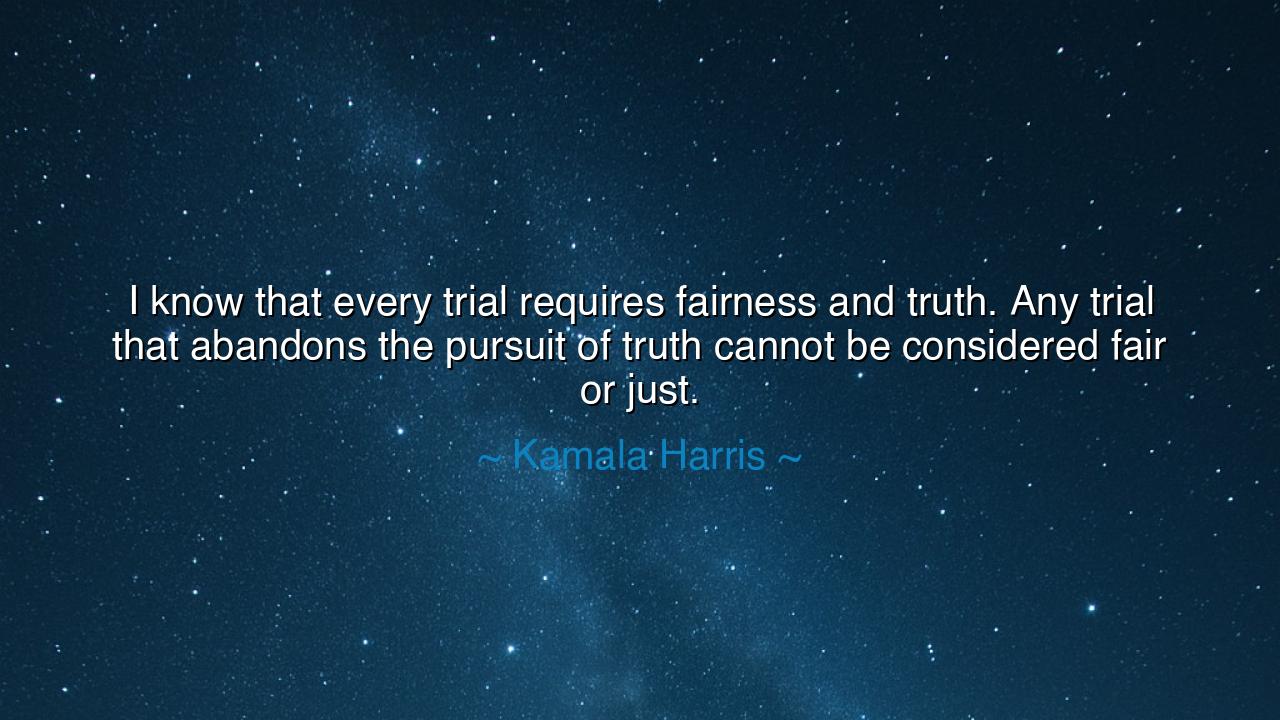
I know that every trial requires fairness and truth. Any trial
I know that every trial requires fairness and truth. Any trial that abandons the pursuit of truth cannot be considered fair or just.






Hear the solemn words of Kamala Harris, spoken with clarity and gravity: “I know that every trial requires fairness and truth. Any trial that abandons the pursuit of truth cannot be considered fair or just.” In this declaration, we find the eternal principle of justice laid bare. A trial is not merely a ceremony of law, not merely the clash of lawyers or the judgment of a court; it is the sacred search for truth. Without truth, there can be no fairness, no justice—only the hollow appearance of order masking corruption. Harris reminds us that justice is not satisfied by procedure alone, but by honesty, integrity, and the fearless pursuit of what is real.
The ancients too revered this principle. In the courts of Athens, the jurors swore to judge “according to the laws and the truth.” Plato himself warned that when truth is abandoned in favor of rhetoric, justice collapses and the city itself decays. The Romans carved the image of Justitia, blindfolded and holding scales, to remind themselves that fairness and truth must outweigh bias and power. Harris’s words echo this ancient heritage: a trial that does not seek truth is not a trial at all, but a performance in service of lies.
Consider the trial of Socrates, that philosopher condemned not for crime, but for truth itself. His accusers sought not fairness, but silence; not truth, but convenience. The jury, swayed by fear and prejudice, abandoned their sacred duty. The result was not justice but injustice—a stain upon Athens that history has never forgotten. Socrates drank the hemlock, but his death testifies eternally to Harris’s principle: when the pursuit of truth is abandoned, fairness is destroyed, and justice dies with it.
The origin of Harris’s words lies in her long service as a prosecutor and lawyer, where she saw firsthand that courts are only as noble as their fidelity to truth. A trial is meant to give every side a voice, to weigh evidence, to uncover what is hidden. Yet too often, trials can be twisted by bias, by prejudice, or by those who place power above principle. In such moments, the ritual remains, but the spirit is gone. Harris names the essence: the only way a trial can be fair is if it relentlessly seeks truth.
This teaching is not only for lawyers and judges—it is for all who live in community. Every dispute, every judgment, every decision we make as people rests upon the same foundation. When we twist truth for convenience, when we abandon fairness for advantage, we commit the same error as corrupt courts. Families, friendships, nations—all crumble when truth and fairness are sacrificed. Only when we uphold them do our dealings become just, our relationships strong, and our societies free.
The lesson, then, is clear: do not accept half-truths where truth is needed, nor tolerate prejudice where fairness is required. Whether in the court of law or in the court of daily life, demand that justice be rooted in reality. For without truth, fairness becomes illusion, and justice becomes tyranny. Harris calls us to vigilance, to remember that every trial—small or great—tests our fidelity to these eternal principles.
Practical steps follow. When you judge others, do so with honesty, not prejudice. When you are called to resolve conflict, listen to every side, seek out evidence, and pursue what is real rather than what is convenient. Support systems of justice that uphold transparency, fairness, and truth, and challenge those that betray them. Above all, teach these principles to the next generation, that they may learn that justice is not the invention of man, but the reflection of eternal truth.
Thus Kamala Harris’s words shine like a beacon: fairness and truth are the twin pillars of every trial. Without them, courts are corrupted, communities fall, and nations stumble. But with them, even the weakest may find justice, and even the mighty may be held accountable. Let us walk in this wisdom: that in all trials of life, small or great, we never abandon the pursuit of truth, for in truth lies the only path to justice.






NBanh nhat bui
I think this quote is a call to hold both our legal system and ourselves accountable. If we fail to pursue the truth in any trial, can we still say we're truly fighting for justice? But also, who gets to define 'truth'? Is it objective, or does it depend on perspective? There are so many layers to this idea of truth in trials.
GDGold D.dragon
Kamala Harris emphasizes an essential point: fairness requires the truth. But I can't help but think—what about cases where the truth is hidden, either intentionally or unintentionally? How can we ensure that justice is still served when the truth is obscured or when it's difficult to uncover?
PNVan Duy Phuonggg Nguyen
I agree with this quote, but it also makes me wonder: does truth always lead to justice? In some cases, the truth might be painful or uncomfortable, and it could create more harm than good. How do we balance the pursuit of truth with the need for healing and reconciliation in difficult cases?
MDHoang Minh Duc
This quote makes me question whether every trial actually upholds the pursuit of truth. It's easy to say that truth should guide justice, but when power dynamics and biases come into play, how much does truth get manipulated? Can we ever truly have fairness if those in power are allowed to distort the truth?
Tthu
Kamala Harris brings up a powerful point about the connection between truth and justice. In my opinion, without truth, any process—be it legal or otherwise—becomes corrupted. But what happens when the truth is unclear or subjective? Can we still claim fairness if the truth itself is uncertain or open to interpretation?